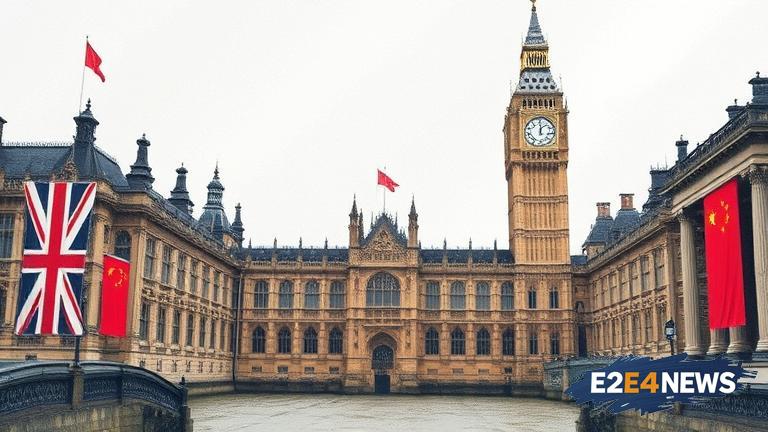The UK government has taken a significant step in addressing the growing concerns over Chinese influence and propaganda by banning the circulation of China Daily, a Chinese state-run newspaper, within the Parliament premises. This move is seen as a response to the increasing scrutiny of Chinese media outlets and their alleged role in spreading propaganda and disinformation. China Daily is known for its pro-Beijing stance and has been accused of promoting the Chinese Communist Party’s (CCP) ideology and interests. The ban is expected to be a major blow to the CCP’s efforts to influence public opinion and shape the narrative on key issues. The UK government’s decision is also seen as a reflection of the growing tensions between the UK and China, particularly in the wake of the COVID-19 pandemic and the ongoing trade negotiations. The ban on China Daily is not an isolated incident, as there have been several instances of Chinese media outlets being accused of spreading propaganda and disinformation in recent years. The UK government has been under pressure to take action against Chinese media outlets, and this move is seen as a significant step in that direction. The ban is also expected to have implications for other Chinese media outlets operating in the UK, as it may lead to increased scrutiny and regulation. The UK government’s decision has been welcomed by critics of Chinese propaganda, who argue that it is a necessary step to protect the country’s democratic institutions and values. However, the move has also been criticized by some who argue that it is an attack on press freedom and may have unintended consequences. The ban on China Daily is also seen as part of a broader effort by the UK government to address the challenges posed by Chinese influence and propaganda. The government has been working to strengthen its defenses against disinformation and propaganda, and this move is seen as a key part of that effort. The UK is not alone in its concerns about Chinese propaganda, as several other countries have also taken steps to address the issue. The US, for example, has designated several Chinese media outlets as foreign missions, requiring them to register with the government and disclose their activities. The EU has also taken steps to address the issue, including the establishment of a new agency to counter disinformation and propaganda. The ban on China Daily is also significant because it highlights the growing concerns about the role of Chinese media outlets in shaping public opinion and influencing policy. Chinese media outlets have been accused of using a range of tactics to influence public opinion, including the use of social media bots and the spread of disinformation. The UK government’s decision to ban China Daily is seen as a response to these concerns, and it is expected to have implications for the way that Chinese media outlets operate in the UK. The ban is also expected to have implications for the UK’s relations with China, as it may be seen as a provocative move by the Chinese government. The Chinese government has been known to respond aggressively to criticism and perceived slights, and it is possible that the ban on China Daily could lead to a deterioration in relations between the two countries. Despite these risks, the UK government’s decision to ban China Daily is seen as a necessary step to protect the country’s democratic institutions and values. The government has a responsibility to protect its citizens from propaganda and disinformation, and this move is seen as a key part of that effort. The ban on China Daily is also significant because it highlights the growing concerns about the role of Chinese influence in the UK. Chinese influence has been a growing concern in recent years, particularly in the wake of the COVID-19 pandemic and the ongoing trade negotiations. The UK government has been under pressure to take action to address these concerns, and the ban on China Daily is seen as a significant step in that direction. The ban is also expected to have implications for other areas of UK-China relations, including trade and investment. The UK government has been seeking to strengthen its trade and investment ties with China, but the ban on China Daily may complicate these efforts. The Chinese government may respond to the ban by imposing its own restrictions on UK media outlets, which could have significant implications for the UK’s media industry. The ban on China Daily is also significant because it highlights the growing concerns about the role of propaganda and disinformation in shaping public opinion. Propaganda and disinformation have been a growing concern in recent years, particularly in the wake of the COVID-19 pandemic and the ongoing social media debates. The UK government’s decision to ban China Daily is seen as a response to these concerns, and it is expected to have implications for the way that media outlets operate in the UK. The ban is also expected to have implications for the UK’s democratic institutions and values, as it may be seen as a necessary step to protect the country from propaganda and disinformation. The UK government has a responsibility to protect its citizens from propaganda and disinformation, and this move is seen as a key part of that effort. The ban on China Daily is also significant because it highlights the growing concerns about the role of Chinese media outlets in shaping public opinion and influencing policy. Chinese media outlets have been accused of using a range of tactics to influence public opinion, including the use of social media bots and the spread of disinformation. The UK government’s decision to ban China Daily is seen as a response to these concerns, and it is expected to have implications for the way that Chinese media outlets operate in the UK.
